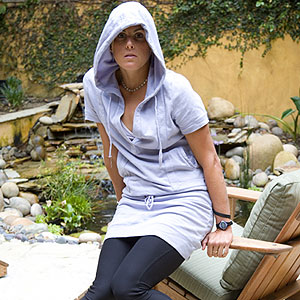Cliff English rides the triathlon coaching roller coaster
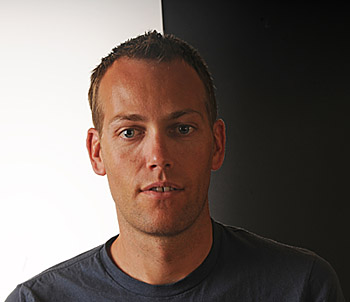
On April 30, USAT eliminated Montreal native Cliff English's position as USAT National Teams Coach. Six months later, he is charged with guiding undefeated Ironman sensation Chrissie Wellington and her presumptive greatest rival, Cliff’s wife-soon-to-be, Samantha McGlone, toward another likely showdown on the Queen K.
Whether he is blessed or cursed, the 37-year-old English is definitely living in interesting times.
The former Canadian junior national cycling team member switched to coaching full time in 2002, serving as a developmental coach under Lance Watson at the Canadian National Training Center in Victoria, British Columbia. There he continued to coach McGlone, studied for his degree in high performance coaching at the National Coaching Institute at Victoria University. At the same time, he worked with Xterra sensation Melanie McQuaid on her swim and run, coached three-time Ironman Hawaii champ Peter Reid on his swim and consulted on general training strategy. By 2004, English guided McGlone to a spot on the Canadian Olympic team, worked with several other Canadian elites and was chosen as Triathlon Canada’s Elite Coach of the year.
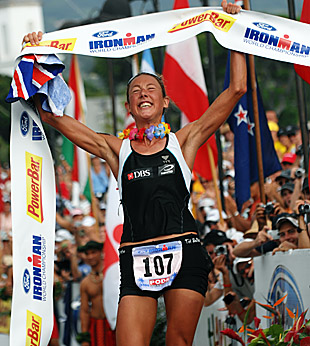
In 2005, USAT high performance director Libby Burrell hired English as the USAT National Teams Coach where he worked with several top American triathletes – mostly in support of their own individual, primary coaches – including Sarah Haskins, Julie Ertel, Jasmine Oeinck, Manny Huerta and Matt Reed.
In the spring of 2008, USA Triathlon Sport Performance Director Scott Schnitzspahn said that English’s position was being eliminated. In a circumspect statement, he paid tribute to English’s rapport with many of the elite athletes under his supervision, his tactical advice and his success in shepherding many young athletes to the limelight. “We see no fault of the coach,” said Schnitzspahn. “It was a difficult role to coach athletes personally and also coach a national team and Cliff did a great job at it. Unfortunately other circumstances made us make a decision now rather than after the Olympics.”
While those circumstances were not specified, working as a hands-on coach and as a team coordinator in the end proved incompatible. English was also a point man in a hothouse situation where dozens of passionate contenders were vying for six Olympic slots. Charged with advising a team of rivals with pre-race strategy and race day tactics, English was an athletic version of a parish priest — sworn to secrecy and commanded to avoid even the appearance of favoritism.
Ultimately, as the brutal tension of Olympic selection races came to a head, some elite US triathletes wanted more than Cliff English could give them and made their dissatisfaction known.
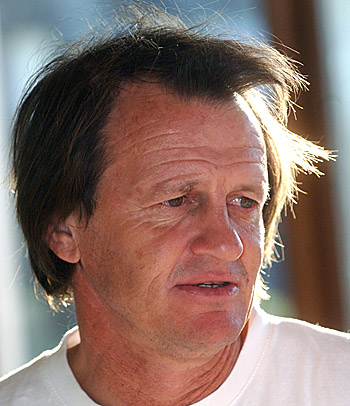
During this time, he also guided coached McGlone to the 2006 Ironman 70.3 World Championship and plotted her almost perfect Ironman Hawaii debut in 2007. McGlone’s second place finish, with a sub-three-hour marathon, was clouded only slightly by the audacious victory of fellow Kona rookie Chrissie Wellington.
Cut to 2008. In the months after English was cast adrift by USAT, Sam McGlone encountered the first major injury in a decade of English’s coaching. As her Achilles tendinitis increased, her world-best half Ironman form gradually went downhill. Not so bad that she couldn’t win three Ironman 70.3 races. But the woman who routinely ran half marathons at 1:18 pace in 2007 was gritting her teeth through a 1:24 that left her third at Vineman 70.3 in July. Finally, with a month to go before her much anticipated return bout with Wellington at Kona, McGlone’s Achilles deteriorated so badly she could not run and had to withdraw. Sam McGlone and husband watched from the sidelines as Wellington won again, virtually unchallenged.
Right after the race, the McGlone-English partnership got a shock. Three members of Brett Sutton’s squad, Ironman winners coming off the best season of their careers, had outgrown the commercial limitations of Team TBB’s development squad approach and were looking for a new coach. They wanted a hands-on coach who could guide them in a framework similar to the Sutton squad system that had worked so well for them.
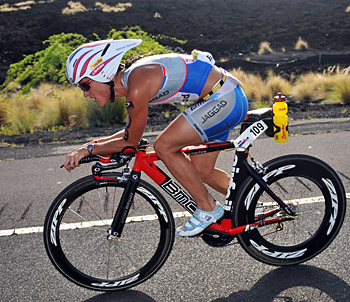
When Belinda Granger, Hilary Biscay and Chrissie Wellington met with English and McGlone, they quickly agreed to work together in 2009. In one fell swoop, English had a golden — but risky — opportunity.
While it is great to have the great new dominator of the Ironman world knock on your door seeking a coach, the downside is equally terrific. Under Brett Sutton’s guidance, Hilary Biscay finally won her first Ironman, Belinda Granger won three Ironman-distance events, and Wellington simply went undefeated and dominated the world of Ironman like a Colossus.
Whatever English did this year could likely never surpass what the three athletes had done in 2008 under Sutton’s guidance. If any or all of the three faltered, English would be subject to the cruel court of short-sighted public opinion.
If you wonder how it might feel, just ask the coaches who followed in the giant footsteps of legends like John Wooden at UCLA basketball, Bear Bryant at Alabama football, or Bill Bowerman at Oregon track.
Now add to that the pressure of coaching both the woman you adore and have coached for 10 years to great success and the one woman in the world who poses the greatest obstacle to your wife fulfilling her dream of winning Ironman Hawaii.
This is where Cliff English finds himself on the verge of the 2009 season.
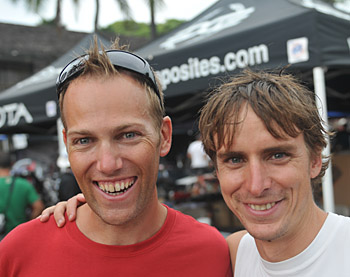
Q&A with Cliff English
Slowtwitch: On April 30, you had a distressing end to your tenure as coach of the elites at USA Triathlon. How does this new opportunity feel?
Cliff English: As one door closes, another opens. This is a great situation for a coach like myself whose strength is understanding people. Although I also know how to use technical information like wattages and other geeky tools – in moderation. For me, the real bottom line to improving performance is what Brett Sutton does so well – understanding what makes people tick and forging relationships with each athlete and fostering productive relationships within the group.
Slowtwitch: Is this a better situation, despite the risks?
Cliff English: It’s nice to be in a situation where my inclinations and strengths are not compromised and I can do what it takes to keep it working. In a national program, those things are naturally always compromised.
Slowtwitch: What is it about running a national program that is doomed to dissatisfaction?
Cliff English: The thing about a national program is that all the athletes are competing with each other for just a few precious Olympic and World Championship slots. When you flow in a few easygoing international athletes, it can diffuse the tension you get when they are all from the same country. As it happened when I worked at the National Training Center in Canada, Sam always did better training with Leanda Cave than with the women with whom she was in direct competition for the Olympic slots. She got along better with the U23 men and a few international women.
Slowtwitch: What are the pluses and minuses of blending in international athletes into a national training program?
Cliff English: International athletes do compete with one another at Worlds and at the Olympic Games because then they are all going for the same medal. But it’s a different world in year-round camps working with foreigners not in direct competition. Unfortunately at USAT, some team members and program leaders could not overlook perceived slights and everything you did was open to charges of unfairness. When I brought in Leanda Cave to work with the women in the USAT program, it became a big issue.
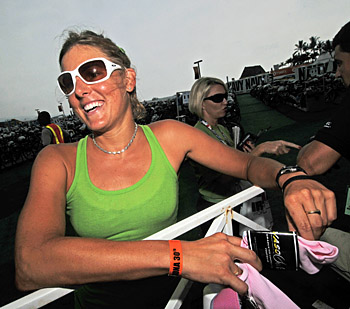
Slowtwitch: Who initiated the talks with the Team TBB athletes?
Cliff English: I first heard about it the day after the race in Kona. Belinda came to me and said she and Hilary and Chrissie were looking for a new coach and wanted to operate as a team. She said that when they talked to other triathletes, my name came up. I Then I got a call from Belinda the week before they announced they were departing Team TBB. She said they wanted to talk. Chrissie flew in from Los Angeles and they met at our house in Tucson. They explained they had been shopping around and checking with different sources about the possibilities of a hands-on coach and we hashed it all out. They all wanted to work this together.
Slowtwitch: Why did they pick you?
Cliff English: Elite triathlon coaches are a small community. Belinda spoke to a few other people who had some good things to say about me. Basically I've been in the sport long time and a lot of athletes are friends of mine. I guess I have a pretty good reputation and I’ve done well. And I am not a coach who will email training programs or post them online. I’m a hands-on coach. That's what I do. I have run squads prior to the US team. That is the way they want to be coached and the way they are used to being coached.
Slowtwitch: What do you think led them to leave the great Brett Sutton?
Cliff English: You should ask them. But in a general sense, sports teams and franchises hit a certain level and it’s hard for the original team to meet the demands of the market. I think lot of it had to do with the fact that Team TBB in Asia had been designed as a development squad.
Slowtwitch: What are the pluses and minuses being handed the world’s best Ironman athlete to coach?
Cliff English: It is pretty daunting prospect, but the possibilities are exciting. I think that Chrissie has the potential to improve her performance physically, psychologically and tactically. Even given her phenomenal results working with Brett Sutton, who did a tremendous job with her, it’s still possible to improve because she is still so new to the sport.
Slowtwitch: What is the best personal approach?
Cliff English: I know that good coaching focuses on the person, not their achievements. As a coach, I am not in awe of their victories. In order to achieve a working trust, you put the achievement aside. A lesser, greener coach might be all over an athlete of that stature. For me, I’m just a coach who must detach himself from the stardom they have acquired and the great things they have already achieved. If that is the first thing on the mind of the new coach, he or she will not be effective. When I worked with Hunter or Peter Reid or Sam, I have to put that aspect behind. I look them in the eye and gave them the real goods.
Slowtwitch: With her perfect record, what is the upside for a coach?
Cliff English: I look at this in a very matter of fact way. I am very fortunate to have been asked to coach another World Champion. It is especially fortunate because you have to look at her as an athlete with a very young training age. She is not someone who has been competing for 10-12 years who has put in a lot of miles in a certain way and may be resistant to change. She is still an athlete in the opportunity phase.
Slowtwitch: What is your attitude to replacing a legend and taking on someone who arguably is his best work of art?
Cliff English: She has had a very strong willed coach. And I will certainly not require her to change fundamentally at all. My goal is to build upon what works with her. While working with her, there are a lot of new things a coach can do with an athlete. But it takes a while to build a relationship. You need to get down to work and build a trust.
It also takes patience.
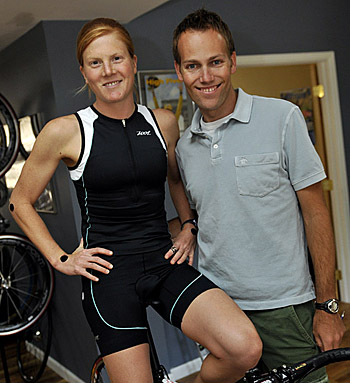
Slowtwitch: Give some examples.
Cliff English: It took Matt Reed a year and a half to reach his potential. While I was working with USA Triathlon, Brett Sutton was his primary coach, but I worked on a consulting basis on some specific issues that needed one-on-one observation. And as such, I enjoyed contributing in some small ways to his development that culminated with his great 2008 season.
Slowtwitch: What was the key to unlocking the giant within Matt Reed?
Cliff English: Consistency was important with Matt Reed. When I first met him, he was sick in ‘05 through ‘06 and into ‘07. We started get him stronger again and bring him back to consistency and fitness. Matt needed a consulting coach who would play a different role. One who would say; Whoa! Whoa! Whoa! And hold him back when necessary. Again, it’s a very intuitive thing.
Slowtwitch; How do you avoid pressing athletes into injury?
Cliff English: Bottom line, I am not in the business of injuring athletes. I am in the business of getting them to reach their potential. When you push the limits, mistakes are going to happen. I pride myself on lifetime of guiding my athletes to avoid and rehabilitate from injuries. I have always been close to athletes and I know how to help them absorb training load and avoid injury and sickness. But even with a good coach, injuries can happen.
Slowtwitch: It must be painful to see Sam struck down by injury?
Cliff English: Some blogs accuse me of precipitating Sam’s injuries. Those comments anger me quite a bit. This is the first injury Sam has had in 10 years working with me. In 2001 through 2003 I picked up many people at the National Training Center with stress fractures and helped put them back on the podium at elite championships.
Slowtwitch: Are you wary about the potential conflicts coaching four strong Ironman athletes?
Cliff English: Definitely it will be challenging. At USAT, whoever I worked with still got the same level of coaching time and expertise. I know I will give them all you got. That’s how I've always looked at it.
Slowtwitch: Did Sam express any worries?
Cliff English: Sam’s bigger fear about this new squad was like this; “Oh shit! You will give all we’ve learned about Ironman to Chrissie and Belinda!” I am sure Sutton’s group had some things figured out. We only prepared Sam for one Ironman, but it was a killer. We got some things figured out, too
Slowtwitch: How do you avoid conflicts?
Cliff English: Through year you don’t want all 4-5-6 girls showing up at the same races at the same time. Ideally they should choose different races that suit each individually through the season. Sutton had them all spread out. Belinda and Chrissie and Bella Comerford and Erika Csomor each had individual goals and they did not choose to race one another all the time. We want to get into a situation with a lot of trust and prepare them all to race to the utmost and absolutely rock in Kona.
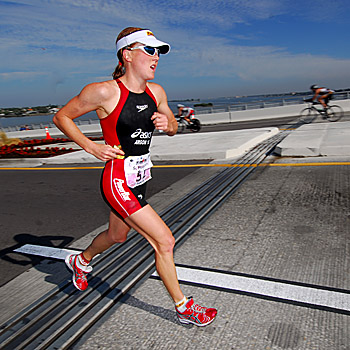
Slowtwitch: Are you worried about athletes getting contentious about not getting enough individual attention? The Rick Hendrick NASCAR team manages do it with superstars Jimmy Johnson and Jeff Gordon and Dale Earnhardt Jr. sharing all car setup information.
Cliff English: That issue has been brought up by outsiders and has been the bane of my existence as a coach. From time to time it’s driven me crazy. I dunno how many times I could not give Sam a split or ignored her to avoid a perceived conflict of interest. It made me miserable and eventually was a contributing reason to perceptions that led USAT to fire me. Honestly, I’m now bitter about what Sam and I sacrificed in that situation. I am up front with girls. I will not ignore Sam any more and the members of our squad will deal with it.
Slowtwitch: What will you in Hawaii about giving splits?
Cliff English: The only initial thought we have going forward is that we will look at that some of those things and address them. My initial reaction is that if Chrissie or Sam asks me I will give each of them the same information. That is the same as my approach at USAT. When I was at a race, all Americans got the same information. The bottom line is that I always have made sure as a coach I do what it takes. If that means getting another person to give splits, I will. In the past, I never had anyone out there to do that. So going forward having even one person to give information would be better than we had before. We will definitely sit down and communicate clearly as a group and make sure all we are all absolutely honest with one another and comfortable with the situation.
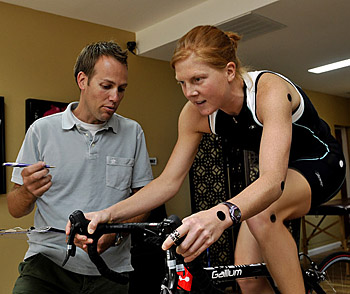
Slowtwitch: Where will you and the squad train?
Cliff English: I do think we will move around the world. I am looking at a startup camp in January-February in Australia, then moving to Tucson for the rest of the spring – March April May. In summer, we will be looking for another location. It could be Europe – or Canada. Then back to Tucson for Kona prep.
Slowtwitch: Why Tucson?
Cliff English: It’s pretty simple. Hilary lives here, Sam and I live here, and it’s a great location. Chrissie liked it when she came. We have great biking and running trails and swimming facilities. It worked for a lot of people in the past – such as Peter Reid. At the same time, the airport is centrally located and you can go anywhere from here. Also, a lot of the girls’ sponsors are based in San Diego. That is one of the reasons why they came and why Sam and I moved here.
Slowtwitch: What are the important factors in creating a training squad?
Cliff English: My primary goal will be to get a few other people involved. I have coached small groups throughout my career. My thought is that 8-12 is a nice number. When you get down to 4-6 people, it’s a little small. You have to be careful. At times you need to manage and balance personalities who come in and out. You want to avoid the pitfalls you find with a smaller group. At USAT, it was very hard to give all the time every athlete wanted. When some athletes came through and worked out with us, some of the athletes were prone to petty jealousies and it finally bit me in the ass.
Slowtwitch: What are some of the pitfalls in creating a successful squad?
Cliff English: You have to be careful to get in few more guys and girls to add to the group chemistry. You want to structure it so each person can benefit the group in different ways. You might need some people who are nice and jell well with the group and act as nice mortars between strong personalities. We had a great group in Victoria. Melanie McQuaid and Sam and Peter Reid and Kelly Guest and Teresa Macel. Within that group there were a few people – not that they weren’t serious, but they cracked a few jokes and helped lighten the atmosphere and helped the entire group to bond. You have to figure out the people who will have synergy and who allow the group to perform together at their best.
Slowtwitch: Sutton was famous for crafting individual workouts for his athletes. How will you go about that?
Cliff English: You always need to not lose focus what works and what is necessary to do for each individual. You might send out Chrissie with the guys or at times with find some guys to run with Sam. Sam has always trained with guys. Good coaches have been doing this for years. While Sam was doing long runs last year, there weren’t any girls available who could run with her for 2 hours 30 minutes at 39 minutes per 10k pace. In the future, Sam might conceivably do some runs with Chrissie. In the past, Sarah Haskins, who is a helluva biker, trained with guys on the bike.
Slowtwitch: What are some of the snags?
Cliff English: With some guys you want in the squad, it gets complicated. It is hard to find a second tier male pro who is cool with where they stand. For a guy to ride with the chicks, you look for some athletes to come in from time to time for specific purposes. You’d want people who are not full members of the squad to work with Hilary on the swim, with Chrissie and Belinda on the bike, and with Sam and Chrissie on the run. We definitely have to define what we are looking for a bit, and we will work hard to find the athletes who can fill the bill.


